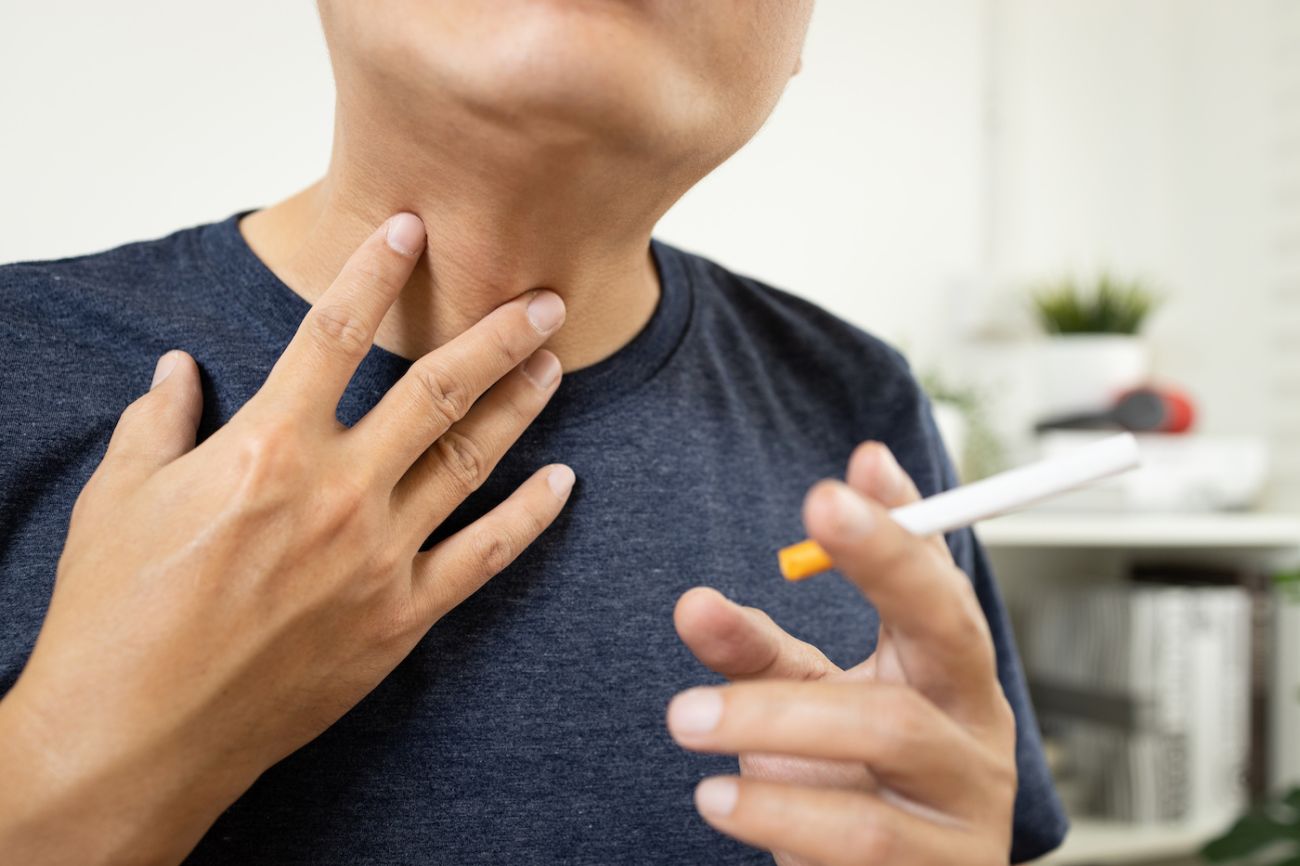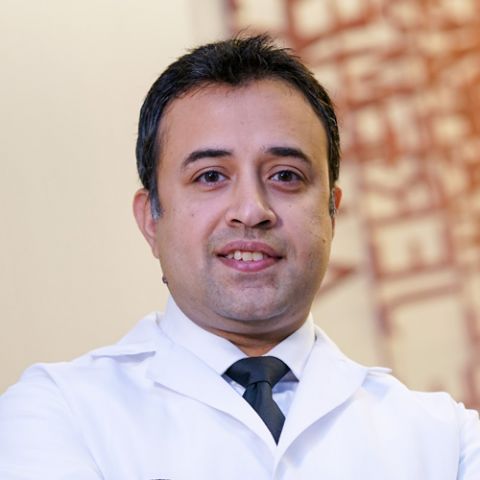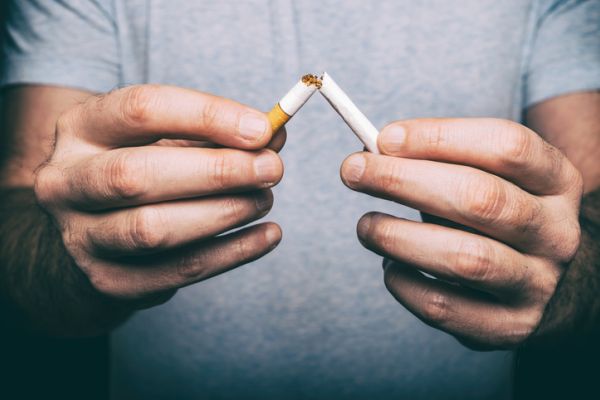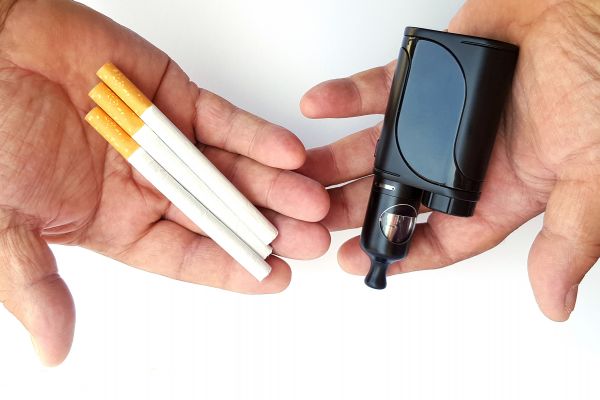Smokers are two times more likely than nonsmokers to develop cancer of the esophagus, the muscular tube that lets food pass from the throat to the stomach. Approximately 16,510 men and 4,130 women will be diagnosed with esophageal cancer this year.
“About half of these cases globally are attributable to smoking while the overwhelming majority of cases nationally are related to smoking,” says Moshim Kukar, MD, Associate Professor of Oncology at Roswell Park Comprehensive Cancer Center.
While some risk factors for esophageal cancer are unavoidable — such as male birth gender and older age — using tobacco of any kind is at the top of the list of changeable risk factors, followed closely by drinking alcohol. Smoking cigarettes, cigars or a pipe, or chewing tobacco puts you at high risk for esophageal squamous cell carcinoma and at moderate risk for esophageal adenocarcinoma, the two most common types of the disease.
- Squamous cell carcinoma is a cancer that starts in the thin, flat cells of the lining of the esophagus. It is generally attributed to DNA damage from smoke and other chemicals from tobacco that trigger abnormal cell changes.
- Adenocarcinoma is a cancer that begins in mucus-producing glandular cells of the esophagus.
Adenocarcinoma is the most common type of esophageal cancer in the United States. If you smoke a pack or more of cigarettes a day, you have at least twice the chance of getting adenocarcinoma of the esophagus than a non-smoker. The risk does not go away if you stop using tobacco.
The link between tobacco and squamous cell cancer of the esophagus is even stronger, but decreases for people who stop using tobacco.
Why is smoking tobacco a high risk for esophageal cancer?
The chemicals in tobacco, consumed in any form, cause damage to the DNA in the esophageal lining cells and impairs the healing of damaged DNA. Tobacco use also weakens the esophageal sphincters, the muscular valves that keeps fluids in the stomach and protects the esophagus. Damage from smoking lets stomach acid to flow back into the esophagus, which can lead to heartburn or gastroesophageal reflux disease (GERD), another risk factor for esophageal cancer.
“Active smoking is predictor of poor outcomes. Active smokers are less likely to respond to treatments and can have early recurrence of the cancer,” Dr. Kukar says.
The risk of developing esophageal cancer in “light smokers” compared to regular smokers is unclear. However, tobacco is a carcinogen, so any amount of tobacco use is associated with a higher incidence of cancer as compared to nonsmokers.
“Research indicates the risk for esophageal squamous cell carcinoma decreases within five years of smoking cessation. Individuals who have quit smoking for more than 20 years reduce their risk to about that of lifelong non-smokers,” says Dr. Kukar.
Never miss another Cancer Talk blog!
Sign up to receive our monthly Cancer Talk e-newsletter.
Sign up!Why is drinking alcohol a risk for esophageal cancer?
Like tobacco use, the more you drink alcohol the higher the risk of esophageal cancer. Heavy drinking increases the risk of esophageal cancer fivefold when compared to people who consume no alcohol.
“Tobacco use and regular alcohol consumption are risk factors for many cancers and especially strong risk factors for esophageal squamous cell carcinoma,” Dr. Kukar says.
In your body, alcohol breaks down into a chemical called acetaldehyde, which damages DNA. It also impairs your ability to absorb critical nutrients and vitamins, can alter hormone levels and may irritate the lining of the esophagus.
Smoking and drinking alcohol together raises the risk of esophageal cancer much higher than use of either alone. Behavioral habits and lifestyle choices can be modified but require change in behavior and attitude that are difficult to address.
Are there routine tests for early detection?
No, although there are guidelines for people with Barrett’s esophagus, a condition in which chronic reflux causes unhealthy changes to esophageal tissue. People who experience difficult or painful swallowing and/or unintentional weight loss should seek medical attention for an upper endoscopy or esophagogastroduodendoscopy (EGD).
Symptoms such as persistent nausea, heartburn, reflux or abdominal pain that does not improve with medication and lifestyle modifications warrant an endoscopy as well.
“Unfortunately, given the incidence of this disease in our country, we don’t have a screening process in place as we do for colon cancer and breast cancer. Reflux disease should be brought to your physician’s attention. Aggressive management can lead to reduction in incidence or early detection and treatment,” Dr. Kukar says.
What can you do to help prevent esophageal cancer?
Lifestyle modification is key. This includes a balanced nutritional diet, no tobacco use, limited alcohol intake, maintaining a healthy weight and light-to-moderate exercise a few times a week.
Tell your doctor if you experience any of the following symptoms:
- Regurgitation, food backing up into mouth and throat
- Difficulty swallowing / feeling like food is stuck in your throat
- Heartburn
- Vomiting blood
- Weight loss
If your doctor suspects that you may have esophageal cancer, your next step may be imaging such as an x-ray, CT, or MRI and an upper endoscopy and biopsy.



